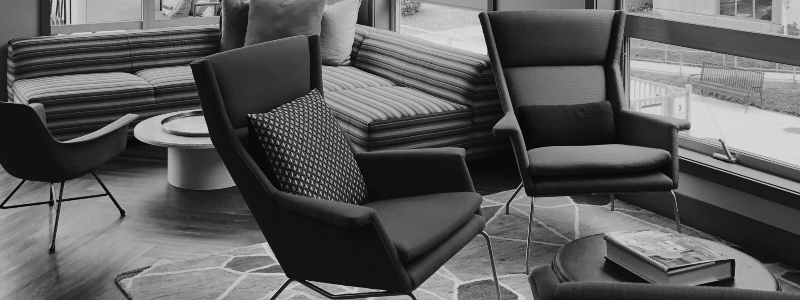Following on from the post featuring Andrew Robinson’s photographs of the rooms at Brighton and Hove Psychotherapy, I want to think about the objects in the room in which therapy takes place.
“Both room and house are psychological diagrams that guide writers and poets in their analysis of intimacy.” (Bachelard, 1958/1994:38). This implies we have a tacit (a felt but not easy to express in words) understanding of the psychology of physical space. I suggest that the surroundings in which therapy happens are part of the therapy.
In contemporary psychotherapy there is a concern about the blurring of the boundary between the personal and professional. In the psychodynamic model if the therapist’s life comes too much into focus the client’s therapeutic potential can be compromised. It is a commonly held belief that therapy should ideally happen in a neutrally private room. However we would want to avoid any resemblance to anything cold, clinical or cell like. Freud is well known for his iconic rug covered couch and his large collection of figures that stood like a group of silent watchers in his consulting room.
A positive approach to the objects and disclosure can provide opportunities for working things through. Let’s think about books on display in the consulting room. A collection of psychotherapy books could be reassuring, showing that the therapist is well informed and takes their professional development seriously. If a client shows an interest in a particular book it can open up an area for exploration.
The impact of objects in the room can become important when a counsellor moves or there is a change in the room. Lapworth describes how when he introduced a sculpture into his consulting room, a client re-saw the room and noticed the books that had been in the room all along. When her attention was drawn to the books by the arrival of a new object, they resonated with her father and she talked about him for the first time (Lapworth, 2012:8).
Field notes the need for counsellors to take transitional objects with them, for example a rug on the floor. When she moved her consulting room a client was relieved to see the rug reappear in the new room. “We came to understand that it was symbolic of my perception of him: that I accepted him as he was; in his words ‘scruffy, imperfect, colourful and well travelled!’ ” (Field, 2007:174).
Therapists can use objects and images to support themselves in their work. A small sculpture or photograph with personal associations or special memories can help a therapist keep an open mind and feel connected with their own resources. Clients can sooth themselves through difficult times by finding reassurance when looking at familiar elements in the room.
Brighton and Hove Psychotherapy is a collective of experienced psychotherapists, psychologists and counsellors working with a range of client groups, including fellow therapists and health professionals. If you would like more information, or an informal discussion please get in touch. Online therapy is available.
References
Bachelard, G. (1958/1994) The Poetics of Space.
Field, R. (2007) Working from home in independent practice.
Lapworth, P. (2011) Tales from the Therapy Room.

Leave a Reply